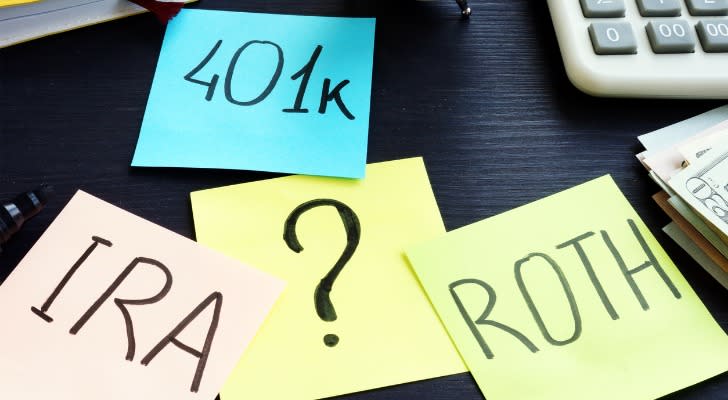How do I know which of my investments are better off in my IRA, Roth IRA or brokerage account?
-Peter
It’s great that you’re considering this – many people overlook the importance of where to hold different investments. Often, this is due to a lack of awareness about how significantly it can impact overall returns.
A financial advisor can help you decide how and where to invest your retirement savings. Connect with a fiduciary advisor.
Tax treatment is the most important consideration when deciding where to keep your various investments. Specifically, you’ll want to consider how different investments create different tax liabilities, as well as the various tax advantages associated with the different accounts you own.
About Asset Location
Before we dive in I want to clarify that this decision is different from a basic Roth vs. pre-tax account comparison. That choice is about when you’d prefer to pay income taxes on your retirement savings: up front on your contributions or in the future on your withdrawals.
The question we’re exploring here assumes we already have money in three types of accounts: a traditional IRA, Roth IRA and taxable brokerage account. Your question speaks directly to what’s called asset location, the strategic placement of investments in different types of accounts to optimize tax efficiency and maximize after-tax returns.
However, asset location is not to be confused with asset allocation – an investment strategy that calls for spreading a portfolio’s capital across various asset classes and diversifying within individual assets classes. (And if you need help with either asset allocation or asset location, connect with a financial advisor and ask what changes they would recommend for you.)
Why Does It Matter?

Let’s review why asset location matters, starting with the basics.
There are two primary ways to earn returns from an investment: capital gains and cash flows. For instance, if a stock’s price rises from $30 to $40, the $10 increase is known as a capital gain, which becomes taxable upon selling the stock. Meanwhile, some investments also provide direct payments, such as dividends and interest, which are taxable when received.
These two types of investment returns are taxed differently, which is a major reason why we want to think about the types of accounts that hold them. (And if you need help selecting tax-efficient investments or managing the taxes your portfolio generates, consider working with a financial advisor.)
Taxation of Capital Gains vs. Cash Flows
Capital gains are either classified as long term or short term. You pay a lower tax rate on long-term capital gains than you do on short-term capital gains:
-
Short-term capital gain: A gain from selling an asset held for one year or less. These gains are taxed at your marginal income tax rate.
-
Long-term capital gain: A gain from selling an asset held for more than one year. These gains are taxed at lower rates of 0%, 15% or 20%, depending on your total income.
Meanwhile, ordinary dividends and interest are considered ordinary income and taxed according to your marginal income tax rate. Some dividends, called qualified dividends, receive long-term capital gain tax treatment. Additionally, interest you receive from municipal bonds is tax-free.
However, in order to simplify so we can focus on the concept of asset location we’ll assume that all of your dividends, interest payments and short-term capital gains are taxed as ordinary income.
(And if you need help assessing the tax efficiency of your portfolio, speak with a financial advisor today.)
IRA, Roth IRA or Brokerage Account?


Assuming you have a diversified portfolio, you likely hold some investments that pay dividends or interest, as well as others that generate capital gains. It’s generally better to place cash-flow producing investments inside tax-advantaged accounts like IRAs and Roth IRAs, and hold investments that pay out less cash in brokerage accounts.
Investments for a Traditional IRA
You may consider placing your investments that generate taxable income in your traditional IRA. Remember, traditional IRAs shield you from taxes until you withdraw the money. Since those withdrawals are taxed as income anyway, you don’t lose any benefit by doing that.
Coupon bonds that make regular interest payments or stocks that pay out a lot of ordinary dividends are good examples of investments that you may consider holding within a tax-deferred account like a traditional IRA or 401(k).
Investments for a Roth IRA
Like traditional IRAs, Roth IRAs provide a tax shield on investments held within the account. You don’t have to worry about taxes on capital gains, dividends or interest with a Roth IRA. However, unlike withdrawals from traditional IRAs, qualified withdrawals from Roth IRAs are tax-free. That’s because Roth IRA contributions are taxed before they go into the account.
To get the most benefit from the tax-free growth that Roth IRAs offer, you would ideally hold the assets most likely to earn a higher compound return over time inside your Roth IRA. This would be your equity investments rather than your fixed income assets (which you may hold in your traditional IRA).
Investments for Brokerage Accounts
Brokerage accounts don’t provide a tax shield the way that traditional and Roth IRAs do. Dividends, interest and gains are all taxable in a brokerage account even if you don’t withdraw the money. So, it’s important to choose more tax-efficient investments.
When possible, you may want to avoid holding bonds, dividend-paying stocks and actively managed mutual funds that distribute a lot of short-term gains in your taxable brokerage account. Rather, consider investments that you can hold for over a year and that don’t generate a lot of cash flow. These may include non-dividend paying stocks and index funds. Doing this may help you limit the number of taxable events that occur within your account and avoid the higher marginal income tax rates.
You’ll also be able to take advantage of tax-loss harvesting in a brokerage account, which can help you reduce your taxes even further. (If you need guidance building an investment portfolio outside of your retirement accounts, consider working with a financial advisor.)
Bottom Line
A properly diversified portfolio will contain a broad mix of investments providing you with a combination of capital gains, dividends and interest payments. Consider how each of these affect your tax liability and be cognizant of your overall “asset location.”
Investments that produce taxable income may be best suited for your traditional IRA. High-growth investments, meanwhile, may work best inside your Roth account. Lastly, consider avoiding dividend and interest-paying investments in your taxable brokerage account, and instead focus on investments that you’ll hold for the long-term that don’t produce taxable income.
However, understand that your target asset allocation isn’t likely to line up perfectly with the amount of money you have in each account. You may end up with some bonds in your brokerage account or stocks in your traditional IRA, and that’s okay. The goal is to place your investments as efficiently as your account balances and asset location allow.
Retirement Planning Tips
-
Whether your retirement savings are spread across various accounts or are concentrated in a single 401(k) or IRA, tracking your progress and estimating how much your money will be worth can help you plan more confidently. SmartAsset’s retirement calculator can help you project how much your savings will be worth when you retire and how much income you can expect to potentially generate.
-
A financial advisor can help you plan and save for retirement. Finding a financial advisor doesn’t have to be hard. SmartAsset’s free tool matches you with up to three vetted financial advisors who serve your area, and you can have a free introductory call with your advisor matches to decide which one you feel is right for you. If you’re ready to find an advisor who can help you achieve your financial goals, get started now.
Photo credit: ©iStock.com/designer491, ©iStock.com/ChayTee
The post Which Investments Are Better Off in My IRA vs. Roth IRA vs. Brokerage Account? appeared first on SmartReads by SmartAsset.
Source Agencies


